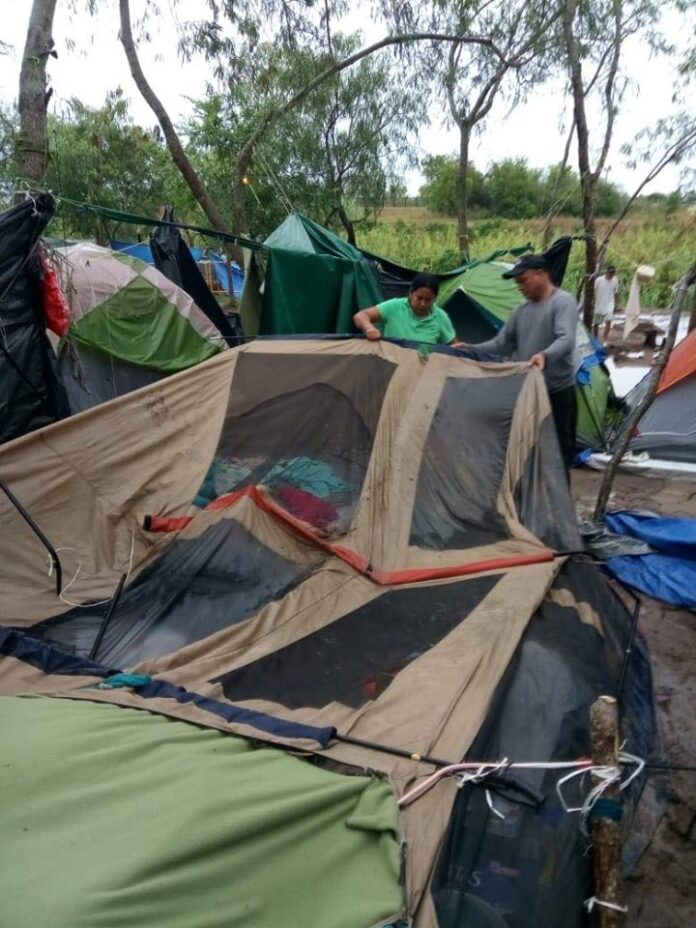A Saturday morning downpour and heavy winds sent the camp of asylum seekers along a levee in Matamoros into disarray, destroying tents and soaking clothing, belongings, and documents over the weekend.
Clay pathways along the river stretching two recreational soccer fields turned to thick, slippery mud. Pools of water collected on uneven ground, overwhelming trenches dug by residents to channel rainwater into the river.
Volunteers continue aid work from afar, sourcing supplies paid for with donations in Mexico while sending skeleton crews of staff to meet asylum seekers in charge of a system of free tent stores to coordinate distribution. Sam Bishop, Project Coordinator at Global Response Management (GRM) in Matamoros, said staff is preparing a plan in the event of a true flood.
The damage and flooding caused by Saturday’s storm was the result of a small cell that lasted only an hour. “We can’t just line the whole river with sandbags. That’s not practical. We have plans to get our own stuff out of there and respond once the flooding goes down and we can help people try to rebuild,” he said.
In the meantime, however, volunteers are responding to needs as they arise. Matamoros has the most cases out of the 890 confirmed positives in the Tamaulipas. The state had reported a total of 55 deaths.
GRM does not currently have any suspected or confirmed COVID-19 cases and all 17 previously suspected patients have recovered. The organization conducted 72 antibody tests using its own supply and is working with the health department to give patients PCR tests if necessary.
Mexico’s National Institute of Migration (INM), in response to the virus’s spread, recently cordoned off the camp’s South entrance and is temperature checking everyone who enters. Spanning canopies set up by Mexico’s federal disaster response agency are being taken down and around 300 families were forced to relocate along the riverbank.
Andrea Rudnik, volunteer coordinator for Team Brownsville, said of the situation, “It’s just one more disruption in their lives. We’re dealing with COVID. We’re dealing with a storm. We’re dealing with disruptions of where they’re living and what they’re doing. Those are things that would impact all of us, especially if we were living outside.”
Team Brownsville estimated a reduction of 200 tents — a result of both the storm and the shutdown of the U.S. asylum system. Both those in Mexico under the Migrant Protection Protocols (MPP, ‘Remain in Mexico’ program) and asylum seekers in process through other programs have no legal pathway to family members in the United States.
Over the weekend, a crew of volunteers with Team Brownsville was able to cross 42 tents – roughly the number of dwellings destroyed by the storm — both on foot and in vehicles. Mexican customs, which usually allows Team Brownsville to bring purchased equipment across in small loads, asked to see receipts and would not allow the tents entry in bulk.
Aid coalitions are collaborating and have provided bleach and detergent to wash clothes and tents to prevent mold and mildew from growing in the heat. Cindy Candia, a founding member of Angry Tias and Abuelas of the Rio Grande Valley, spent Monday in Matamoros purchasing supplies.
According to aid workers, some asylum-seeking families are opting to being in the asylum process in Mexico. Those with MPP hearings in the tent court system in Brownsville were previously handed notices to appear with continuances.
The delays have been repeatedly extended due to the virus and as of this week stretch through June 22. “Individuals with a hearing date prior to June 22nd should present themselves at the port of entry identified on their tear sheet one month later than the date indicated on their most recently noticed date,” read guidance published on the Executive Office of Immigration Review’s website.
Starting May 10, the agency specified it had temporarily suspended in-person document service until June 8 but did not provide an alternative to successfully serve documents to asylum seekers living homeless across the river.
The Matamoros-based Resource Center continues to provide camp sanitation services, the facilitation of Lawyers for Good Government’s remote legal assistance program, hospital and doctor visits, and supplies but is starting to feel the economic impact of fewer volunteers, said Executive Director Gaby Zavala.
She echoed concerns that the shutdown of the asylum system is causing real harm. “I guarantee you this is causing people to enter in non-traditional ways. People are determined to get to their families. When you reduce the legitimate ways to get in, you’re increasing the number of people that are going to enter in alternative ways,” she said.




